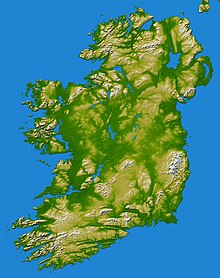 A topographic map of Ireland, after which Erin is named | |
| Pronunciation | /ˈɛrɪn/ |
|---|---|
| Gender | Mainly female (with some male) |
| Origin | |
| Word/name | Hiberno-English derivative of Irish “Éirinn” |
| Meaning | Ireland (West), green water, |
| Region of origin | Gaelic & Celtic |
| Other names | |
| Related names |
|
Erin is a personal name taken from the Hiberno-English word for Ireland, originating from the Irish word "Éirinn". "Éirinn" is the dative case of the Irish word for Ireland, "Éire", genitive "Éireann", the dative being used in prepositional phrases such as "go hÉirinn" "to Ireland", "in Éirinn" "in Ireland", "ó Éirinn" "from Ireland".
The dative has replaced the nominative in a few regional Irish dialects (particularly Galway-Connemara and Waterford).[1] Poets and nineteenth-century Irish nationalists used Erin in English as a romantic name for Ireland.[2] Often, "Erin's Isle" was used. In this context, along with Hibernia, Erin is the name given to the female personification of Ireland, but the name was rarely used as a given name, probably because no saints, queens, or literary figures were ever called Erin.[3]
According to Irish mythology and folklore, the name was originally given to the island by the Milesians after the goddess Ériu.
The phrase Erin go bragh ("Éire go brách" in standard orthography, dative "in Éirinn go brách" "in Ireland forever"), a slogan associated with the United Irishmen Rebellion of 1798, is often translated as "Ireland forever".[4] The songs 'Let Erin Remember' and 'Érin grá mo chroí' are more examples of the word's usage in Irish romantic nationalism.[5][6]
- ^ Behind the Name: Meaning, Origin and History of the Name Erin
- ^ Irish Melodies. Collins & Payn. 1828.
- ^ Osborn, Susan (1999). What's in a Name? (illustrated ed.). Simon and Schuster. p. 250. ISBN 978-0671025557. Retrieved 6 August 2013.
- ^ Dolan, Terence Patrick (2020). A Dictionary of Hiberno-English. Gill Books. ISBN 9780717190744.
- ^ Chant, C. (2013). The Handbook of British Regiments (Routledge Revivals). Taylor & Francis. ISBN 9781134647316. Retrieved 12 April 2018.
- ^ Williams, Sean; Laoire, Lillis Ó (2011). Bright Star of the West: Joe Heaney, Irish Song Man. Oxford University Press. pp. 20–21. ISBN 978-0-19-532118-0.